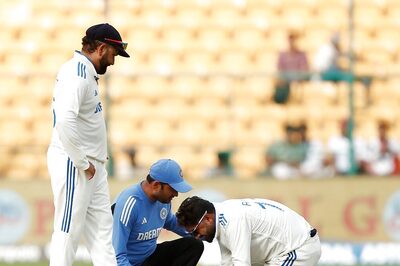
views
New Delhi: Inadequate skill enhancement institutions and lack of affordable and proper lodging facilities for students are among the top concerns for the youth in Delhi, who have offered a slew of suggestions to urban authorities for the upcoming master plan. Young citizens of Delhi aged 15-30 years and numbering about 450 expressed their viewpoints as part of an online consultative meeting ‘Youth Sabha’ organised by the Delhi Development Authority (DDA) and the National Institute of Urban Affairs (NIUA), to take their inputs for the Delhi Master Plan 2041.
DDA officials on Saturday said the meeting was held on Thursday and two more Youth Sabha are lined up on October 1 and October 3, all three meetings on different themes. The theme for Thursday’s meet was ‘Delhi as a city of learning’.
“One of the primary concerns for most of the youth was the lack of institutions that could help them acquire gainful employment within Delhi. They are of the opinion that even if they do somehow educate themselves in reasonably good schools and colleges and perform to the best of their abilities, they do not necessarily get employed,” the DDA said in a statement on Saturday. They felt there was a need for “equitably distributed skill enhancement institutions” that would help them hone their employability skills and make them ready for the job market, officials said.
“The gap between job-seekers and actual available jobs is vast and some concrete steps need to be taken to bridge that gap, in order to prevent the youth from taking up anti-social activities to sustain themselves in the city,” the statement said. The lack of accessible educational institutions for some city residents is a matter of “grave concern”, officials said.
Some of the youth rued there are no colleges for up to 10 km radius from their neighborhood. Metro and buses are not affordable for them on a daily basis, they said. Another major issue raised by them on the online forum was of “lack of proper housing for students and other youth”.
“They (youth) elaborated on how a good housing facility was unaffordable, and the ones that they could afford (near the institution) were plagued with anti-social elements,” the statement said. This has made it impossible for students to find a suitable place to live and study. This was especially cited by civil services aspirants living in areas such as Mukherjee Nagar, it said.
“There is no upper limit on the number of students lodged in a single room at a paying guest facility, and no proper facilities are there as well. Seeing the apathy, it makes it doubly tough for female aspirants to stay in these areas,” officials said, quoting the youth who raised the matter. Many youths also felt that such “uncomfortable and negative environment makes some aspirants feel suicidal and many others end up becoming social outcasts”, the statement said.
The meeting was attended by senior officers from DDA and NIUA, along with the facilitators from supporting organisations, PRIA and IGSSS, it said. The objective of this consultation was to take the views of the youth of Delhi, so as to know what more can be provided, besides existing facilities to ensure quality education and living that is accessible to all, the urban body said.
The dialogue aimed to focus on the access to associated amenities like housing, connectivity to these institutions, to capture the kind of skills young people want to acquire and the kind of provisions that can facilitate employability for all sections of the city, it said. Other issues raised included lack of libraries in most of the districts which hampers fresh graduate students, especially girls, as they are not able to travel long distances because of societal pressures, officials said.
Need for community or neighbourhood-level amenities such as libraries, skill development centres and employment assistance centres was expressed unanimously. Another point made by the youth was that online classes were not as well received as they should be, it said. There is a need for community-level online class hub where less fortunate students are encouraged to come and gain knowledge, the youths suggested.
Accessibility to social infrastructure such as schools and colleges was another concern that was shared by most of the young participants. A youth from Najafgarh in south west Delhi mentioned how the nearest college in the area is 25 kms away, taking an hour one-way to traverse that distance, officials said.
Others also mentioned that most of the youth staying in the peripheral areas of Delhi end up travelling 25-40 kms one-way to reach their schools or colleges. This is not only time-consuming, but also unsafe for young women as they do not always get to travel by appropriate means of commuting, officials said. The youth also felt there should be an agency that deals with mental, physical health and their status of employment post school or college graduation, the DDA said.
.
Disclaimer: This post has been auto-published from an agency feed without any modifications to the text and has not been reviewed by an editor














Comments
0 comment